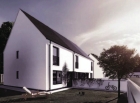Baxi contributes to energy savings for Fife Housing Innovation Showcase

As part of the recent Fife Housing Innovation Showcase in Dunfermline, Baxi supported the Future Affordable housing project with the latest in ultra-efficient gas boiler technology. Future Affordable is a collaborative project that aims to deliver a sustainable and affordable housing system for the social rented and private market. Various systems have been optimised to deliver a terrace of three homes designed for tenancy, which will demonstrate how to achieve 2013 Low Carbon and 2016 Zero Carbon.
These homes feature Baxi Duo-tec combi boilers with Gas Adaptive (GA) control and Multifit GasSaver flue-gas heat-recovery technology designed to maximise fuel efficiency and minimise carbon emissions.
GA control constantly monitors gas and oxygen levels and adapts the operation of the boiler to optimise combustion efficiency and a wide modulation range of 1:7.
Installed neatly between the boiler and the flue, the GasSaver device recovers heat from flue gases that would other be lost to atmosphere. The captured heat is used to pre-heat cold mains water coming into the boiler to reduce energy usage for hot-water demand by up to 37% and water consumption by up to 7% compared to a combi boiler not using a GasSaver.








